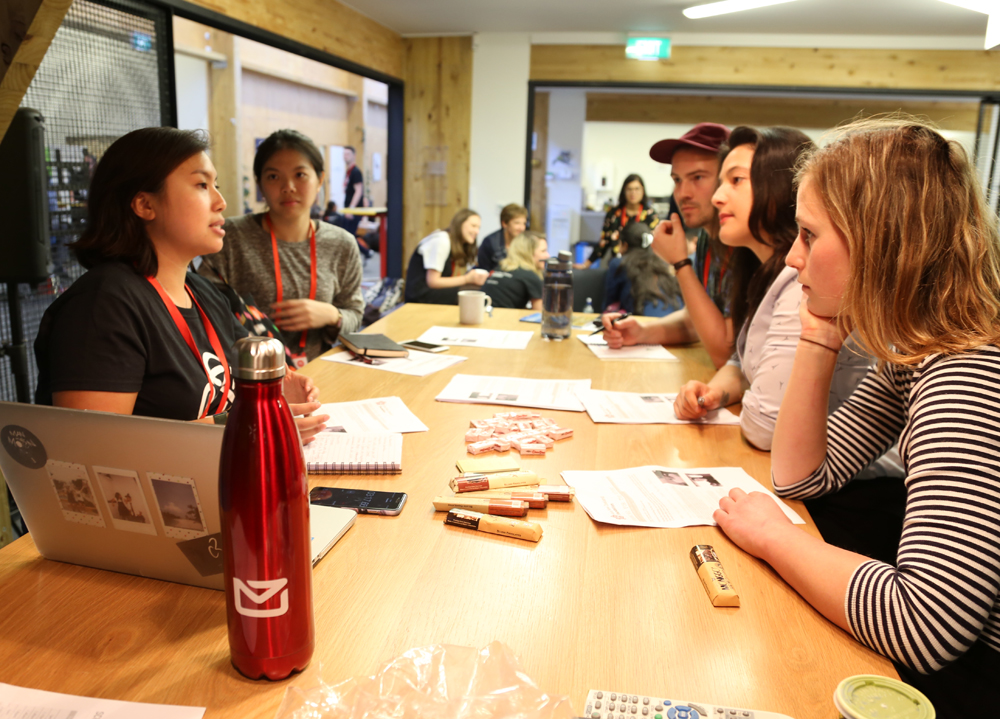In September, I was privileged to travel to New Zealand under the Asia New Zealand Foundation’s Young Business Leaders Initiative to attend and run a workshop at the Social Enterprise World Forum 2017 (SEWF). The workshop was called Farming for the Future and this was a great opportunity to share more about AGREA and provide advice and anecdotes on my experience engaging with farming communities in Marinduque, Philippines.

Rachel (far left) running a session at the Farming for the Future workshop
Established in 2008, SEWF is an annual conference that seeks to advance social enterprise development globally. SEWF brings together social enterprise practitioners, support agencies, investors, public, private and government representatives to collaborate, share best practice and plan future developments.
This year, SEWF brought nearly 2000 people together from all corners of the globe. As someone who is fairly new to the ‘social enterprise’ world it was an incredibly eye-opening week and it has really fuelled my passion to see businesses infuse social justice into the core of their work.
I was able to engage in great discussion about the meaning of ‘social enterprise’ and the various legal structures existing around the world. Just like in many other countries, the Philippines has no legal definition for social enterprise and therefore those of us in the field find ourselves in somewhat of an identity crisis. How can we be a for-profit entity that also does good?
There are a number of definitions floating around, however, the Akina Foundation in New Zealand provides the following:
Social enterprises are purpose-driven organizations that trade to deliver social and environmental impact. With social enterprise, it is less about the “who” and more about the “what”. A wide range of organizations can and do deliver social enterprise.
Imagine a spectrum: on one end are traditional businesses that exist to make a profit often without consideration of the impact on the environment and people. On the other end are charities, not-for-profit entities that we understand exist to do good. Social enterprises fit somewhere in the middle.
Interestingly, I and other Southeast Asian-based colleagues agreed that in our region many social enterprises are trying to run away from the term. Unlike in New Zealand where social enterprise is a relatively new movement, in Southeast Asia the concept has existed for a while and has become distorted.
There has been a mushrooming of new self-proclaimed social enterprises that unfortunately are just jumping on the bandwagon without actually or genuinely seeking social justice.
It is funny to hear the war stories of the older generation. Those who simply saw a need in society and decided to meet it through the platform of a business. Whether that’s connecting marginalized farmers to the market or providing employment opportunities to those with access needs.
These practitioners never sought to start a social enterprise; however, the term has been slapped onto their respective businesses in order to fit our need for labels. I have come to the conclusion that the term doesn’t really matter; what matters is whether a business genuinely operates in a purpose-driven way.
Social enterprise does not mean small fry and it is time government and policy makers took notice. As people become more socially conscious, policy makers must keep up and understand what these social and environmental impacts are. Governments must be willing to work with social enterprises and see them as viable contributors to the economy. As these social and environment concerns turn into non-negotiable elements of business, government departments may miss out or lag behind on good opportunities if they don’t decide to start learning and engaging now.
At the forum, I saw how social enterprises really could tangibly change lives and the environment. I heard about at-risk youth who, through the social enterprise Messy Bessy, were able to get an education and gain employment. I heard about Anteater who are exploring new sources of protein (insects!) that promotes environmental and health benefits.
There is a real case for social entrepreneurship. And while social enterprises aren’t perfect, the cumulative good they produce is something that cannot be ignored.
Rachel is the director for engagements and negotiation for AGREA, an agro-social enterprise that aims to help eradicate poverty for farming and fishing families to alleviate the effects of climate change and establish food security in the Philippines.
This article was originally published on the AGREA website


